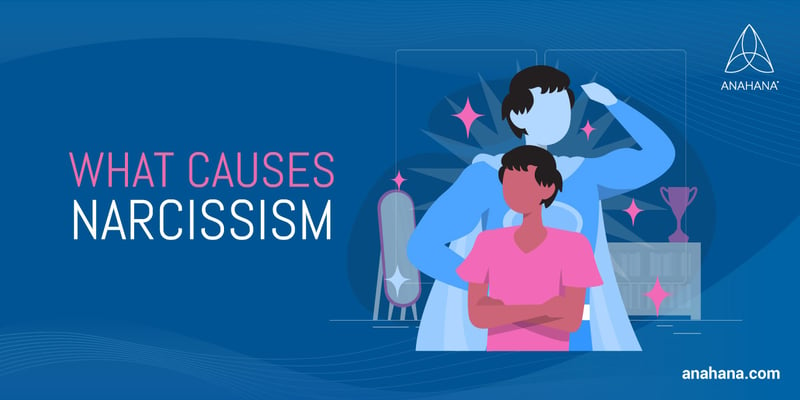
Table of Contents
Learn about narcissism, spot red flags in relationships, and discover ways to heal and grow from narcissistic experiences.
What is Narcissism?
Narcissism is a term we've all come across, increasingly so these days in popular media. But what is narcissism exactly? When might we be misusing the term?
Typically, we associate narcissism with selfishness or difficulties considering or understanding someone else's perspective or feelings (a lack of empathy).
While these traits or behaviors can certainly be challenging and even harmful to deal with, they don't necessarily make someone a narcissist. We all may show some narcissistic tendencies from time to time, but having narcissistic personality disorder (NPD) is a more deeply ingrained pattern.
So, let's dig into what narcissism really means, how it may show up in our lives, and find ways to heal from narcissistic relationships or our even own tendencies - all of which are opportunities for growth.
The Narcissism Spectrum
Narcissistic traits or behaviors aren't as clear-cut as they're often portrayed in casual conversations or on social media. In reality, these behaviors exist on a spectrum, where people may exhibit some signs of narcissism but not others, and to varying degrees.
Imagine encountering someone who seems oblivious to how their actions impact those around them. While they may be challenging to interact with, it's important to avoid jumping to conclusions and labeling them as narcissists.
However, there are instances where certain traits do lean more towards narcissism. This might involve struggling to empathize with others or consistently prioritizing one's own needs over others'.
When these self-focused tendencies become entrenched and start affecting our relationships, it could indicate a deeper issue known as Narcissistic Personality Disorder (NPD). Individuals with NPD often:
- carry an inflated sense of self-worth
- find it hard to understand others' perspectives (a lack of empathy)
- are constantly seeking praise and approval
Next, we will take a look at the different types of narcissism and explore what could be driving these behaviors.
The Different Types of Narcissism
Narcissistic Personality Disorder (NPD) is a diagnosable condition listed in the Diagnostic and Statistical Manual of Mental Disorders (DSM), alongside many other mental health disorders. In the DSM, there are nine traits associated with NPD, and to receive this mental health diagnosis, an individual must exhibit five or more of these traits:
- A sense of grandiosity, feeling more important or superior than others
- Fantasies of success, power, beauty, or finding their perfect love
- Belief in uniqueness, feeling one of a kind and only truly understood by people of perceived status
- Always seeking admiration and validation from others
- Expecting special treatment or compliance with desires, as if it's owed
- Using others, without concern for their well-being
- A lack of empathy, struggling to understand or care about the feelings of others
- Feeling envious of others or assuming that others are jealous
- Displaying arrogant behavior, acting superior or better than other people
While the DSM-5 describes a single syndrome, research suggests different subtypes of narcissistic personality disorder, including:
- Grandiose "Overt" Narcissism: People with grandiose narcissism tend to exhibit overt grandiosity, seeking attention and entitlement while often appearing charming. However, they may overlook others' needs and exploit them without remorse.
- Fragile/Vulnerable "Covert" Narcissism: Vulnerable narcissism can be harder to detect. Individuals may seem shy and reserved on the surface, but inside, they have a hidden sense of importance. They might feel envious of others and take criticism very personally.
- High-Functioning "Exhibitionist" Narcissism: These people are outgoing and love being the center of attention. They may seem successful and charming, but they struggle to connect with others on a deeper level and may not truly understand empathy.
Causes of  Personality Disorder
Personality Disorder

Understanding why someone develops NPD involves careful consideration of many highly complex and multi-faceted factors, including developmental, environmental, psychological, and neurobiological influences. These factors intertwine and interact in intricate ways, and evaluation by a qualified mental health professional is needed to make a formal diagnosis.
Genetics
Research indicates that certain genetic factors might heighten the risk of developing NPD. Think of it like inheriting physical traits from family members; similarly, we might inherit predispositions toward certain personality traits, such as heightened sensitivity to criticism or a strong need for admiration.
When combined with early life experiences, these genetic elements influence our sense of self and our interactions with others.
Excessive Praise and Constant Admiration
Excessive praise and constant admiration during childhood can also contribute to the development of NPD. Picture a child constantly being told they're extraordinary or better than others.
While it may seem positive, this constant praise can distort their perception of themselves and their relationships with others due to their exaggerated sense of self-importance.
Early Childhood Trauma
Narcissists may be individuals who were deeply wounded during their formative years. Picture it as layers of protection built up around their inner self. These protective parts, like gaslighting or manipulation, emerge as a defense mechanism against the pain they experienced in childhood, and their low self-esteem that is too painful or terrifying to now consciously acknowledge.
While these protective parts shield them from further hurt, they can also lead to harmful behaviors towards others, which we should never tolerate or excuse, regardless of the underlying pain that drives them.
Red Flags: Things to Look Out For in Relationships
When spotting potential red flags in relationships, it often takes time and observation to recognize certain patterns. Whether it's a romantic partner, family member, friend, or colleague, here are some key signs to watch out for:
Love Bombing

Imagine starting a new relationship and feeling like you've found the missing piece of your puzzle. That's what love bombing feels like: intense, overwhelming affection showered upon you from the very beginning. It's like being swept off your feet by someone who seems to understand and adore you like no one else ever has.
However, this early rush of affection can sometimes be a tactic used by narcissists to hook you in. They might tell you everything you've ever wanted to hear, making you feel cherished and valued.
But beware of the speed at which this affection escalates; declarations of love and plans for a future together on the third date could be a sign of love bombing.
Also, pay attention if they try to move the relationship forward too quickly, like wanting to move in together after just a few weeks.
Rude Behavior Towards Others
When you're out with someone, and they're rude or dismissive towards waitstaff, it's more than just a one-off bad day. It's a red flag that signals a lack of empathy and respect for others. This behavior might be an attempt to impress you or assert their dominance in the situation.
Watch out for how they treat people in various contexts, not just when they're trying to make a good impression.
Controlling Behaviors
One of the earliest signs of a controlling partner is their attempt to isolate you from loved ones. They might subtly undermine your relationships with friends and family by planting seeds of doubt or creating conflict before you're supposed to spend time with them. This manipulation aims to make you more dependent on them, as they want to be the center of your world.
Pay attention to any attempts to control your actions or decisions, especially when it comes to your social life and the health of your relationships.
Trauma Bonding and Codependency
For some, recognizing patterns of codependency can make them more susceptible to falling into a toxic relationship dynamic. Codependents often have protector parts like people-pleasing and perfectionism, which can make them easy targets for narcissists.
In a way, the narcissist becomes an external protector for the codependent, soothing their core wounds of not feeling good enough. This bond can be addictive, as it triggers familiar feelings from childhood and reinforces a distorted idea of love.
As the relationship progresses, the cycle of affection and conflict perpetuates, creating a deeply ingrained trauma bond that can be difficult to break free from. It's essential to recognize these patterns and seek support to heal from the effects of any potential trauma bonding.
How to Leave and Heal From a Narcissistic Relationship
Leaving a narcissistic relationship and beginning the journey toward healing demands tremendous courage and self-love. Remember, your safety and well-being come first. It's okay to seek support and guidance from a mental health professional if you feel overwhelmed or uncertain about the next steps.
You deserve compassion and support as you work through this challenging transition. Here are some gentle steps to help guide you through the process:
Focus on Your Needs and Boundaries
Take time to reconnect with yourself by reflecting and journaling on what brings you joy, fulfillment, and a sense of purpose. Explore your interests, passions, and values. Pay attention to how different relationships or interactions leave you feeling – do they uplift and energize you or drain and deplete you?
Recognize and gently work through any tendencies toward people-pleasing. Learn to advocate for yourself by setting healthy boundaries. Remember, it's always okay to prioritize your own well-being and to say no when necessary.
Accept That You Can't Save Others
Many individuals who have experienced narcissistic relationships may have internalized a belief that they are responsible for the well-being of others. This dynamic often stems from childhood experiences and can lead to a pattern of trying to "fix" people in adulthood.
Understand that each person is responsible for their own journey of healing and growth, and it's not your responsibility to save or change others. Unfortunately, many individuals with NPD do not seek treatment. This could be because they lack insight into their condition or resist addressing perceived shortcomings.
Cultivate Healing Connections
Communication is predicated on the other person not only listening but also caring,”― Ramani Durvasula, Should I Stay or Should I Go? Surviving a Relationship with a Narcissist.
Surround yourself with supportive and nurturing relationships where you feel valued, respected, and validated. Seek out connections with people who honor your boundaries and prioritize your well-being.
Takeaway
While it's important to recognize the deep wounds that individuals with narcissistic traits may carry, it's equally important to prioritize your own well-being and safety. You don't need to tolerate harmful behavior or sacrifice your own happiness for the sake of others.
Frequently Asked Questions
Is narcissism a mental illness?
Although not all forms of narcissism are pathological, extreme narcissism can be a mental illness or a diagnosable mental health condition. Narcissistic Personality Disorder is a spectrum disorder that ranges from mild to severe. People with NPD who fall on the extreme end of the spectrum display what is known as "pathological narcissism."
Do narcissists have feelings?
Narcissists do have feelings, but their emotions are often shallow and short-lived. They may feel what is known as "narcissistic supply," which is a rush of positive emotion that they get from admiration, attention, or success.
However, they often lack empathy and depth of feeling, making it difficult for them to understand or care about the emotions of others from a place of authenticity.
Can other mental health conditions look like narcissism?
Absolutely. It's always important to keep in mind that mental health is complex and nuanced. Other personality disorders like borderline personality disorder (BPD) and antisocial personality disorder (APD) may exhibit behaviors similar to narcissism.
Additionally, low emotional intelligence or emotional dysregulation (something we all experience) can sometimes resemble narcissistic tendencies, though the intentions behind them differ significantly.
Understanding these distinctions requires careful observation and professional evaluation by a mental health provider.
References
Narcissistic Personality Disorder: Diagnostic and Clinical Challenges | AJP
The Three Subtypes of Narcissistic Personality Disorder | Psychology Today
5 Types of Narcissism and How to Spot Each | PsychCentral
15 Signs You're Dealing With A Narcissist, From A Therapist | mindbodygreen
Speaking of Psychology: Recognizing a narcissist, with Ramani Durvasula, PhD | APA
Disclaimer
The contents of this article are provided for informational purposes only and are not intended to substitute for professional medical advice, diagnosis, or treatment. It is always recommended to consult with a qualified healthcare provider before making any health-related changes or if you have any questions or concerns about your health. Anahana is not liable for any errors, omissions, or consequences that may occur from using the information provided.

By: Anahana
The Anahana team of researchers, writers, topic experts, and computer scientists come together worldwide to create educational and practical wellbeing articles, courses, and technology. Experienced professionals in mental and physical health, meditation, yoga, pilates, and many other fields collaborate to make complex topics easy to understand. Anahana is also home to specialists in crystals, tarot, angel numbers, astrology, life path numbers, zodiac signs, and horoscopes. By combining evidence-based wellness with spiritual and energetic practices, the team offers clear, trustworthy guidance for both mind-body health and modern spirituality.